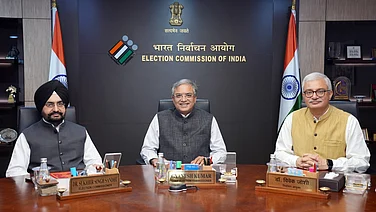In May 2016, the BJP rode to power in Assam on the promise of freeing the state of ‘illegal’ migrants and corruption. Weeks after taking oath on 5 June, Chief Minister Sarbananda Sonowal held a meeting with all the FT members of the state. No other state in the country was facing a ‘grave situation because of infiltration of foreigners like Assam’, Sonowal told them, and added that the members ‘have got a golden opportunity to work for a national cause’. The CM also said no Indian citizen ‘should be harassed during the process of detection of foreigners’ and that the process ‘should be transparent’.
A year later, the contracts of nineteen FT members were terminated because their ‘performance was unsatisfactory’. The Telegraph quoted an anonymous source claiming that the Assam government was ‘unhappy with some of the orders’ by these members, ‘where the individuals in question were declared “not foreigners”, contrary to submissions made by police’. The source added that the state government had ‘already challenged more than twenty such orders in Gauhati High Court’. A sacked member anonymously told journalist Sangeeta Barooah Pisharoty, ‘Most of the cases that came before me couldn’t be declared foreigners because they had all the papers. How could I have gone against the rules?’
Data from the FTs indicate that the new regime did bring about a change in their functioning. For instance, government figures show that a total of 4,072 persons were declared ‘foreigners’ by the FTs in 2015, and 5,096 persons the next year. But in 2017, the numbers spiked to 15,541. In 2018, by August, 13,558 persons had been declared ‘foreigners’. It was alleged that the interference of the executive in the FTs had also increased.
Terminated FT members moved the Gauhati High Court against the government order. One of the petitioners argued that the performance of the members should be ‘monitored by a Bench of the High Court and not by executive officers’. Submissions made by the state government and the high court in their affidavits during the proceedings of these cases revealed how critically performance appraisal of FT members was done by the Home and Political Department of the Assam government. Such reviews by the government curtailed the judicial independence of the FTs and laid it bare to the contentious influence of the executive.
FTs function in the midst of a jugalbandi between the Home and Political Department of the state government and the Gauhati High Court. The court interviews candidates for selection as FT members and monitors the functioning of FTs as per the apex court’s order, but the members are appointed and their salaries are paid by the state government. The salaries of the members are paid by the state.
A state government affidavit in the case said that the high court had ‘expressed the view in the monitoring meetings that the performance of the Foreigners Tribunal Members needs to be monitored and reviewed’ by the government. ‘Performance’ of the members has always been an important topic at the monitoring committee meetings, the affidavit said. ‘Government is of the view that the performance of Members is a key for success of detection of foreigners in Assam and hence, the performances were main indicator for granting extension.’
What exactly the state government meant by ‘performance’ and how it was measured became evident in a document annexed to the affidavit. In a ‘performance appraisal’ report dated 30 April 2017, the state government compared how many cases were disposed of by members and in how many of them the suspect was declared a ‘foreigner’. The criterion for terminating the nineteen members appeared to be that they had declared a comparatively lower percentage of people as ‘foreigners’, even though their rate of case disposal was in some cases higher than those of the retained members. The performance of seventy-two members was listed in the report, and eighteen of them were marked as ‘not satisfactory’ by the state government. All but one among them had declared less than 10 per cent of cases as ‘foreigners’.
In Dhubri, Karthik Ray had disposed of nearly 26 per cent of his cases, declaring only 1.32 per cent as ‘foreigners’. His performance was ‘not satisfactory’; whereas Narayan Nath, who got ‘good’ in his review and was retained, disposed of 15.85 per cent of his cases but declared over 34 per cent of those as ‘foreigners’. In Nagaon, out of the 621 cases Mamoni Rajkumari disposed of, she declared only fifty persons as ‘foreigners’ and got a performance appraisal of ‘not satisfactory’; while Moonmoon Borah, declaring 273 ‘foreigners’ from 401 cases, received a ‘good’ review. In Mangaldoi, Babita Das got ‘not satisfactory’ even after declaring 42.95 per cent of cases as ‘foreigners’, probably because she could dispose of only 156 cases (11 per cent), an abysmally low number on the chart. Ray told the New York Times that ‘most of the references’ that police made to his tribunal to investigate suspected foreigners ‘were against Muslims’. He said, ‘You have to declare “foreigners” means you have to declare the Muslims.’
Rajkumari, who was formerly member of FT No. 6 of Nagaon district and was one of the members who petitioned the high court, told me that there was pressure from the government to dispose of a case within sixty days and that the FTs often suffered from manpower shortage, including that of peons, typists and clerks. The state government, however, denied any allegation of bias when I approached officials for a response for my story.
L.S. Changsan, the then principal secretary in the Home and Political Department, told me it was in the law that the FTs dispose of cases within sixty days. She said the allegation that the Border Police was given targets to make a certain number of references to the FTs was ‘completely wrong’. ‘Building up institutions takes time,’ she said, ‘and we are empowering them (FTs) to enhance their capacity in every way.’
On 22 December 2017, in an order on the petitions by the terminated members, the Gauhati High Court upheld the scrutiny of FT orders by the executive. ‘There has to be a mechanism in place to scrutinize the opinions of the FTs for the purpose of making a conscious decision as to whether such opinions are required to be assailed before a higher forum,’ the order said. ‘To that extent, constitution of the State Level Screening Committee and District Level Screening Committees cannot be faulted with though considerable arguments had been advanced that the executive could not have scrutinized the opinions given by the Members of FTs.’
The court said that since references are made by the state, the state ‘can certainly form Committees to scrutinize the opinions rendered’. The court set aside the government order and noted that it would be ‘obligatory for the High Court to assess the petitioners’ to decide whether an extension should be granted or not.
In February 2018, the state government was asked by a member of the legislative assembly (MLA) from the AIUDF whether people were declared as ‘foreigners’ despite their possessing proper documents. The government told the assembly that no such case of ‘bias’ was reported and, moreover, the ‘matters of the FTs are directly monitored by the Honourable Gauhati High Court’.
(Published with permission from Harper Collins Publishers)





















